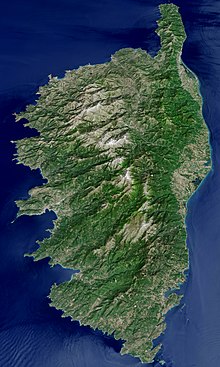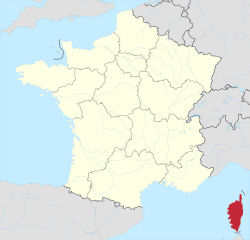
Back Korsika Afrikaans Korsika ALS ኮርሲካ Amharic Corcega AN Corsica ANG كورسيكا Arabic قرشيقة ARY كورسيكا ARZ Córcega AST Corse suyu Aymara
Collectivity of Corsica
| |
|---|---|
 | |
| Anthem: Dio vi salvi Regina (unofficial) | |
 Location of Corsica within France | |
| Country | |
| Prefecture | Ajaccio |
| Departments | 2
|
| Government | |
| • President of Executive Council | Gilles Simeoni (Femu a Corsica) |
| • President of the Corsican Assembly | Marie-Antoinette Maupertuis |
| • Prefect | Amaury de Saint-Quentin |
| Area | |
• Total | 8,722 km2 (3,368 sq mi) |
| Population (2024)[1] | |
• Total | 355,528 |
| • Density | 41/km2 (110/sq mi) |
| • Languages | Corsican French Ligurian |
| Demonym | Corsican |
| GDP | |
| • Total | €10.304 billion (2022) |
| • Per capita | €30,500 (2022) |
| Time zone | UTC+1 (CET) |
| • Summer (DST) | UTC+2 (CEST) |
| ISO 3166 code | FR-20R |
| Website | www |
Corsica (/ˈkɔːrsɪkə/ KOR-sik-ə; Corsican: [ˈkorsiɡa, ˈkɔrsika]; Italian: Corsica; French: Corse [kɔʁs] ⓘ)[3] is an island in the Mediterranean Sea and one of the 18 regions of France. It is the fourth-largest island in the Mediterranean and lies southeast of the French mainland, west of the Italian Peninsula and immediately north of the Italian island of Sardinia, the nearest land mass. A single chain of mountains makes up two-thirds of the island. As of January 2024[update], it had a population of 355,528.[1]
The island is a territorial collectivity of France, and is expected to achieve "a form of autonomy" in the near future.[4] The regional capital is Ajaccio. Although the region is divided into two administrative departments, Haute-Corse and Corse-du-Sud, their respective regional and departmental territorial collectivities were merged on 1 January 2018 to form the single territorial collectivity of Corsica. Corsican autonomy is more extensive than in other regional collectivities of France and the Corsican Assembly is permitted to exercise limited executive powers. Corsica's second-largest town is Bastia, located in the prefecture of Haute-Corse.
Corsica was ruled by the Republic of Genoa from 1284 to 1755, when it seceded to become a self-proclaimed, Italian-speaking Republic. In 1768, Genoa officially ceded it to Louis XV of France as part of a pledge for the debts incurred after enlisting French military help in suppressing the Corsican revolt; as a result, France annexed the island in 1769. The future Emperor of the French, Napoleon Bonaparte, was a native Corsican, born that same year in Ajaccio: his ancestral home, Maison Bonaparte, is now a visitor attraction and museum. Because of Corsica's historical ties to Tuscany, the island has retained many Italian cultural elements, and many Corsican surnames are rooted in the Italian peninsula.
French (Français) is the official and most widely spoken language on the island with Corsican, the native language and an Italo-Dalmatian language, also recognized as one of France's regional languages.
Corsica is the third-least populated region of France after Mayotte and French Guiana.
- ^ a b INSEE. "Estimation de population par région, sexe et grande classe d'âge – Années 1975 à 2024" (in French). Retrieved 17 January 2024.
- ^ "EU regions by GDP, Eurostat". Retrieved 18 September 2023.
- ^ Italian: [ˈkɔrsika]; Ligurian: Còrsega
- ^ Dodman, Benjamin (12 March 2024). "French and Corsican officials strike deal in 'decisive step' towards island's autonomy". France 24.

